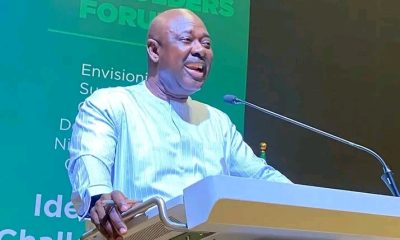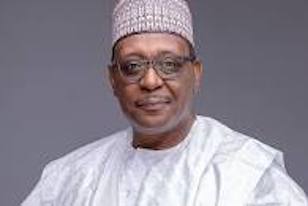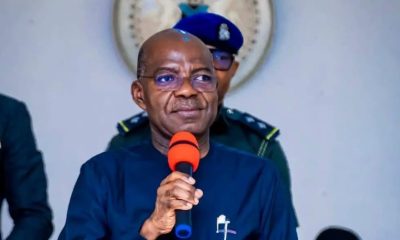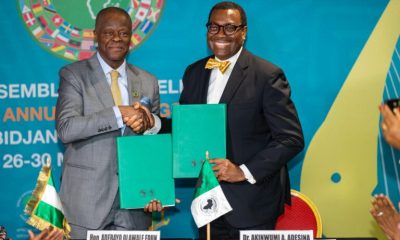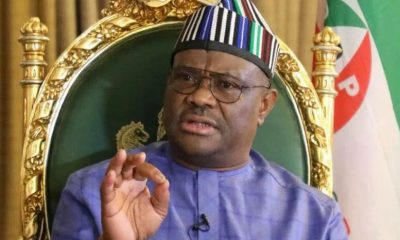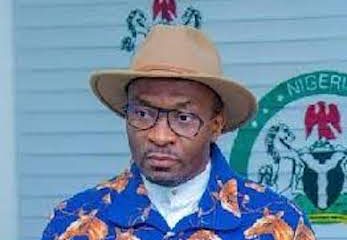Economy
How we Spent COVID-19 Funds so Far- FG
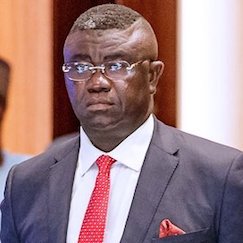
Prince Clem Agba, Minister of State, Ministry of Budget and National Planning, on Thursday gave a breakdown of the COVID-19 expenditure in the country.
Agba revealed this at the COVID-19 Transparency and Accountability Project (CTAP) Conference organised by Connected Development (CODE) in partnership with BudgIT civil society organisation in Abuja.
According to Agba, of the N500 billion COVID-19 funds, N288billion has been released to implementing agencies to support programmes and Federal Government, while the Ministry is now in the process of releasing additional sum to Ministries, Departments and Agencies (MDAs).
“The total package includes, N500billion stimulus from special federal government account in the budget, and a N1.
8 trillion through financial institutions.“From the N500 billion stimuli from the revised 2020 budget there is provision of 126 billion to build resilience health system in Nigeria to prevent possible loss of lives.
“The government set out to improve health infrastructure by building molecular labs in 52 federal medical centres and teaching hospitals across the country.
“Others include provision of isolation centres, paying hazard allowance for health professionals, providing personal protective equipment for security agencies and hospitals to continue their operations supporting agencies like the NCDC, NAFDAC among others to play their roles in combating this pandemic.’’
Agba said that a total of 522 ICU beds were provided amounting to 10 ICU beds in each of the 52 federal medical centers and teaching hospitals across the country.
He said that the Federal Government also took measures to support states respond to the pandemic, adding that in the first instance, 50 per cent of the 500 billion was released to the various responsible agencies.
He added that each of the 36 states including the FCT were given a billion Naira to help fight COVID-19 except for Lagos that got 10 billion and Kano that got 5 billion due to their population.
“Most of the MDAs received at least 50 per cent of the budget for projects, like Ministry of Agriculture which has N34 billion as budget for rural roads was given 50 per cent of that amount and they were also given 50 per cent of the amount for land preparation which is N1.25 billion.
“The mass rural electrification and solar power strategy had N6.2 billion released to them FERMA received 30 billion for bridges and major roads, Ministry of Trade and Investment got N75 billion MSME programmes, while federal medical centres with about N49 billion budget received 50 per cent of that amount allocated .’’
Agba said that the government also put all loan repayment by the various state governments on hold, this included repayment of both the principal loan and the accrued interest.
He said that this was to stimulate the economy and prevent job loss, adding that the plan included supporting micro small and medium enterprises through survival funds .
He said that this provision included MSME guaranteed uptake simulation scheme that was to sustain 300,000 jobs in 100,000 MSME by generating uptake and priority products ,extending payroll supports and establishing facilities in all six geopolitical zones.
He said that the establishment of the MSME survival fund was to also sustain 700,000 jobs in 140,000 MSME and 1500 self employed individuals through grants in all six geo political zones.
Agba said that the government also provided over 12 billion mass rural electrification and solar power and N60 billion for road construction and rehabilitation across the country.
He added that the public works programmes recruited 1000 persons per local government for the 36 states and the FCT resulting in 774,000 persons being employed.
He said that the president directed the disbursement of COVID-19 cash transfer to additional 1million households as part of the social intervention programmes to protect the vulnerable adding that the register was being updated with the new households ahead of disbursement.
He said that there was provision for the aviation sector with support to local airlines as well as other aviation business and also provision for post COVID job creation schemes for youths and women .
Agba said that there were provisions targeted at the agric sector to ensure food and job security and to achieve this, government plans included mapping of farms and farmers registration, site sampling and creating access roads to markets among others.
He said that this took the form of building more than 300 roads across 266 agro communities for access.
Agba also took timeout to clarify some misconception about Nigeria’s stimulus response to COVID-19 .
“It is false, that Nigeria received 5.6 billion dollars as donations towards COVID-19, you know, the pandemic impacted the global oil market which reduced Nigeria’s revenue by about 57 per cent due to reduced oil price.
“Nigeria obtained these loans of 5.6 billion dollars from the world bank, the IMF, the Islamic development bank and the African development bank as budget financing for the revenue shortfall so they were not donations.
“The 2.3 trillion stimulus package comprise the N500 billion stimulus from special federal government account in the reversed 2020 budget and N1.8 trillion through CBN interventions to the private sector to stimulate the economy.
“So the 1.8 trillion are not funds that are going to MDAs ,they are meant for the private sector.’’
Agba said that other donations in kind, received by the federal government included personal protective equipment ,test kits and 200 ventilations as bilateral support .
He said that the president approved the release of 70,000 tons of food from the federal strategic grain reserve and they were distributed to state governments as palliatives for distribution to citizens .
He, therefore, said that it should not be said that federal government was involved in the hoarding of palliatives.
Agba said that the Federal Government had ensured that several accountability mechanisms were put in place to guarantee the proper utilisation of these funds and an app was being developed to help citizens keep abreast with the utilization of these funds.
Chief Executive Officer, CODE, Hamzat Lawal, said that the conference was organised in partnership with BudgiT ,to point the torch on the role of state actors, stakeholders, civil society organisations and citizens in the accountability process of the COVID-19 intervention Funds.
Lawal said that CSOs were very much concerned with expenditure knowing that there was a short fall of revenue and knowing that there was increase in unemployment.
He said that data revealed that there was an increase in loan both from IMF and other multilaterals adding that “we have not seen a clear cut strategy from government on how these loans would be paid.
“How the government is engaging young people and how are they planning to pay back the loan, how is the government using this loan?
“ We are not satisfied with the implementation of COVID-19 funds and how the government is providing palliatives and stimulus plans, when you put side by side the resources released and what is happening on ground definitely we are not satisfied.’’
Lawal expressed hope that deliberations at the conference would go a long way to amend some things , because since the beginning of the COVID-19 ,there had not been any meeting like this that brought key stakeholders particularly government officials saddled with the responsibility to oversee the disbursement of COVID-19 resources together.
“So I am excited that CODE in partnership with budgiT is able to bring stakeholders together and get government officials answer critical questions to provide directions .
“This is because with the advent of fake news and misinformation, it is pertinent that government is able to respond proactively to provide timely information for citizens so that we can remain united as we fight the pandemic.’’(NAN)
Economy
We’ll Continue Borrowing Within Sustainable Limits- FG

The Federal Government says it will continue to borrow within manageable and sustainable limits in accordance with the Debt Management Office (DMO) debt sustainability framework.
This is contained in a statement by the Director, Information and Public Relations in the Ministry of Finance, Mr Mohammed Manga, in Abuja on Wednesday.
President Bola Tinubu recently requested the approval of the 2024 – 2026 external borrowing rolling plan from the National Assembly.
Tinubu has requested the National Assembly’s approval to secure external loans of 21.5 million dollars and 15 billion Yuan, along with a grant of 65 million Euro, as part of the federal government’s proposed 2025–2026 external borrowing plan.
Manga said that the proposed borrowing plan was an essential component of the Medium-Term Expenditure Framework (MTEF) in accordance with both the Fiscal Responsibility Act 2007 and the DMO Act 2003.
“The plan outlines the external borrowing framework for both the federal and sub-national governments over a three-year period, accompanied by five detailed appendices on the projects, terms and conditions, implementation period, etc.
“By adopting a structured, forward-looking approach, the plan facilitates comprehensive financial planning and avoids the inefficiencies of ad-hoc or reactive borrowing practices.
“This strategic method enhances the country’s ability to implement effective fiscal policies and mobilise development resources,” he said.
According to the statement, the borrowing plan does not equate to actual borrowing for the period.
“The actual borrowing for each year is contained in the annual budget. In 2025, the external borrowing component is 1.23 billion dollars, and it has not yet been drawn.
“This is planned for H2 2025, the plan is for both federal and several state governments across numerous geopolitical zones including Abia, Bauchi, Borno, Gombe, Kaduna, Lagos, Niger, Oyo, Sokoto, and Yobe States.
“Importantly, it should be noted that the borrowing rolling plan does not equate to an automatic increase in the nation’s debt burden.
“The nature of the rolling plan means that borrowings are split over the period of the projects, for example, a large proportion of projects in the 2024–2026 rolling plan have multi-year drawdowns of between five to seven years which are project-tied loans,” Manga said.
He said that these projects cut across critical sectors of the economy, including power grids and transmission lines, irrigation for improving food security, fibre optics network across the country, fighter jets for security, rail and road infrastructure.
According to him, the majority of the proposed borrowing will be sourced from the country’s development partners, like the World Bank, African Development Bank, French Development Agency, European Investment Bank, JICA, China EximBank, and the Islamic Development Bank.
Manga said that these institutions offer concessional financing with favourable terms and long repayment periods, thereby supporting Nigeria’s development objectives sustainably.
He said that the government seeks to reiterate that the debt service to revenue ratio has started decreasing from its peak of over 90 per cent in 2023.
Manga said that the government has ended the distortionary and inflationary ways and means.
According to him, there is significant revenue expectations from the Nigerian National Petroleum Corporation Limited (NNPC Ltd), technology-enabled monitoring and collection of surpluses from government owned enterprises and revenue-generating ministries, departments, and agencies and legacy outstanding dues.
“Having achieved a fair degree of macroeconomic stabilisation, the overarching goal of the federal government is to pivot the economy onto a path of rapid, sustained, and inclusive economic growth.
“Achieving this vision requires substantial investment in critical sectors such as transportation, energy, infrastructure, and agriculture.
“These investments will lay the groundwork for long-term economic diversification and encourage private sector participation.
“Our debt strategy is therefore guided not solely by the size of our obligations, but by the utility, sustainability, and economic returns of the borrowing,” he said.(NAN)
The Federal Government says it will continue to borrow within manageable and sustainable limits in accordance with the Debt Management Office (DMO) debt sustainability framework.
This is contained in a statement by the Director, Information and Public Relations in the Ministry of Finance, Mr Mohammed Manga, in Abuja on Wednesday.
President Bola Tinubu recently requested the approval of the 2024 – 2026 external borrowing rolling plan from the National Assembly.
Tinubu has requested the National Assembly’s approval to secure external loans of 21.5 million dollars and 15 billion Yuan, along with a grant of 65 million Euro, as part of the federal government’s proposed 2025–2026 external borrowing plan.
Manga said that the proposed borrowing plan was an essential component of the Medium-Term Expenditure Framework (MTEF) in accordance with both the Fiscal Responsibility Act 2007 and the DMO Act 2003.
“The plan outlines the external borrowing framework for both the federal and sub-national governments over a three-year period, accompanied by five detailed appendices on the projects, terms and conditions, implementation period, etc.
“By adopting a structured, forward-looking approach, the plan facilitates comprehensive financial planning and avoids the inefficiencies of ad-hoc or reactive borrowing practices.
“This strategic method enhances the country’s ability to implement effective fiscal policies and mobilise development resources,” he said.
According to the statement, the borrowing plan does not equate to actual borrowing for the period.
“The actual borrowing for each year is contained in the annual budget. In 2025, the external borrowing component is 1.23 billion dollars, and it has not yet been drawn.
“This is planned for H2 2025, the plan is for both federal and several state governments across numerous geopolitical zones including Abia, Bauchi, Borno, Gombe, Kaduna, Lagos, Niger, Oyo, Sokoto, and Yobe States.
“Importantly, it should be noted that the borrowing rolling plan does not equate to an automatic increase in the nation’s debt burden.
“The nature of the rolling plan means that borrowings are split over the period of the projects, for example, a large proportion of projects in the 2024–2026 rolling plan have multi-year drawdowns of between five to seven years which are project-tied loans,” Manga said.
He said that these projects cut across critical sectors of the economy, including power grids and transmission lines, irrigation for improving food security, fibre optics network across the country, fighter jets for security, rail and road infrastructure.
According to him, the majority of the proposed borrowing will be sourced from the country’s development partners, like the World Bank, African Development Bank, French Development Agency, European Investment Bank, JICA, China EximBank, and the Islamic Development Bank.
Manga said that these institutions offer concessional financing with favourable terms and long repayment periods, thereby supporting Nigeria’s development objectives sustainably.
He said that the government seeks to reiterate that the debt service to revenue ratio has started decreasing from its peak of over 90 per cent in 2023.
Manga said that the government has ended the distortionary and inflationary ways and means.
According to him, there is significant revenue expectations from the Nigerian National Petroleum Corporation Limited (NNPC Ltd), technology-enabled monitoring and collection of surpluses from government owned enterprises and revenue-generating ministries, departments, and agencies and legacy outstanding dues.
“Having achieved a fair degree of macroeconomic stabilisation, the overarching goal of the federal government is to pivot the economy onto a path of rapid, sustained, and inclusive economic growth.
“Achieving this vision requires substantial investment in critical sectors such as transportation, energy, infrastructure, and agriculture.
“These investments will lay the groundwork for long-term economic diversification and encourage private sector participation.
“Our debt strategy is therefore guided not solely by the size of our obligations, but by the utility, sustainability, and economic returns of the borrowing,” he said.(NAN)
Economy
Organise Informal Sector, Tax Prosperity Not Poverty, Adedeji Tasks Officials

The Chairman, Joint Tax Board (JTB), Dr Zacch Adedeji, has urged officials of the board to organise traders and artisans into a formal body before capturing them in the tax net.
Adedeji said that this was in line with the agenda of President Bola Tinubu not to tax poverty but prosperity.
The chairman stated this at the 157th Joint Tax Board meeting held in Ibadan, on Monday.
The theme of the meeting “Taxation of the Informal Sector: Potentials and Challenges”.
Speaking on the theme of the event, Adedeji stressed the need to evolve a system that would make the informal sector formal before it could be taxed.
Adedeji, who also doubles as the Chairman, Federal Inland Revenue Service, (FIRS), said “What I would not expect from the JTB meeting is to define a system that would tax the informal sector.
“The only thing is to formalize the informal sector, not to design a system on how to collect tax from market men and women.
“As revenue administrator, our goal is to organise the informal sector so that it can fit into existing tax law.”
Citing a report of the National Bureau of Statistics (NBS) in the first quarter of 2023, the chairman said that the nation’s unemployment index was attributable to recognised informal work.
Adedeji stated that workers in that sector accounted for 92.6 per cent of the employed population in the country as at Q1 2023.
“JTB IS transiting to the Joint Revenue Board with expanded scope and functions.
“We are hopeful that by the time we hold the next meeting of the Board, the Joint Revenue Board (Establishment) Bill would have been signed into Law by the President.
“The meetings of the board provide the platform for members to engage and brainstorm on contemporary and emerging issues on tax, and taxation,” he said.
In his address, Gov. Seyi Makinde of Oyo State, said the theme of the meeting was apt and timely, stressing that it coincides with the agenda of the state to improve on its internally generated revenue.
According to him, the meeting should find the best way forward in addressing the issue of the informal sector and balance the identified challenges.
“Nigeria is rich in natural resources, but it is a poor country because economic prosperity does not base on natural resources,”
Makinde also said that knowledge, skill and intensive production were required for economic prosperity, not just the availability of natural resources.
He stressed the need to move from expecting Federal Allocations to generating income internally.
“We are actively ensuring that people are productive and moving the revenue base forward,” Makinde said.
The governor said that tax drive should be done by simplifying tax processes, incentives for compliance like access to empowerment schemes and loans.
He urged JTB to deepen partnership and innovation in using data on tax to track and administer it.
Earlier, the Executive Chairman, Oyo State Board of Internal Revenue, Mr Olufemi Awakan, said the meeting was to address tax-related matters, evolve a workable, effective and
efficient tax system across the states and at the Federal level.
He urged participants to find amicable solutions to challenges of tax jurisdiction, among others.
Tax administrators from all the 36 states of the federation, who are members of JTB, were in attendance. (NAN)
Economy
Customs Zone D Seizes Contraband Worth N110m

The Nigeria Customs Service (NCS), Federal Operation Unit (FOU), Zone D, has seized smuggled goods worth over N110 million between April 20 till date.
The Comptroller of Customs, Abubakar Umar, said this at a news conference on Tuesday in Bauchi.
He listed the seized items to include 11,200 litres of petrol; 192 bales of second hand clothing, 140 cartons of pasta, 125 pairs of jungle boots, 47 bags of foreign parboiled rice and 9.
40 kilogramme of pangolin scales.Umar said the items were seized through increased patrols, intelligence-led operations, and strengthened inter-agency collaboration.
The comptroller said the pangolin scales would be handed over to the National Environmental Standards and Regulations Enforcement Agency (NESREA) for appropriate action, while the seized petrol would be auctioned, and the proceeds remitted to the federation account.
He attributed the decrease in smuggling activities of wildlife, narcotics, and fuel to the dedication and professionalism displayed by the personnel in line with Sections 226 and 245 of the NCS Act 2023.
The comptroller enjoined traders to remain law abiding, adding the service would scale up sensitisation activities to combat smuggling.
“We remain resolute in securing the borders and contributing to Nigeria’s economic development,” he said.
The FOU Zone D comprises Adamawa; Taraba, Bauchi, Gombe, Borno, Yobe, Plateau, Benue and Nasarawa. (NAN)

